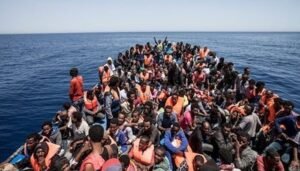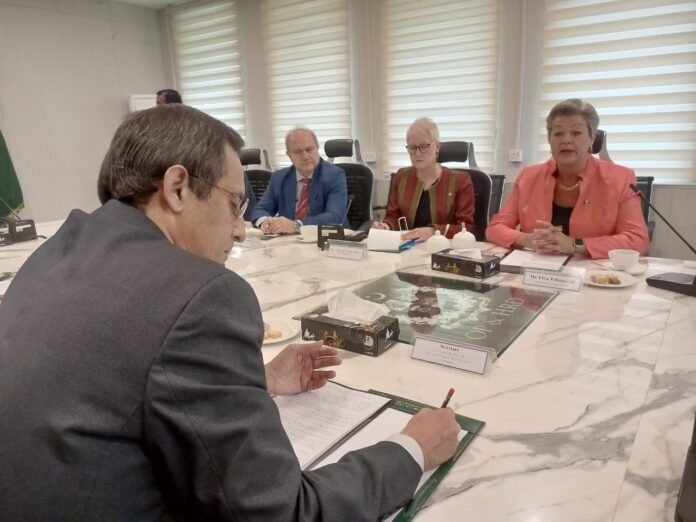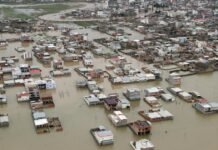European Commissioner for Home Affairs, Ylva Johansson, recently visited the Ministry of Overseas Pakistanis and Human Resource Development to discuss mutual interests and migration issues. A key announcement from her visit was the launch of the ‘Pakistan-EU Migration and Mobility Dialogue’, aimed at creating new opportunities for regular migration from Pakistan to Europe.¹
This initiative is expected to strengthen cooperation between Pakistan and the EU on migration-related issues, including legal pathways for migration, addressing irregular migration, and enhancing return, readmission, and reintegration processes. The dialogue will also explore possibilities for skilled Pakistani workers to migrate to Europe, promoting legal and safe pathways.
Johansson’s visit underscored the importance of cooperation between Pakistan and the EU on migration and security issues. Her discussions with Pakistani officials focused on areas such as counterterrorism, border management, and the fight against human trafficking and smuggling.
The problem of Human Trafficking is not created in a single day, it has long history, for considering such problems I am explain some reasons below:

Human Trafficking and Smuggling from Pakistan: An Urgent Concern
Human trafficking and smuggling are grave global issues that continue to affect millions of lives every year, and Pakistan is no exception. These illicit activities prey on the vulnerable, exploiting their desperation and often forcing them into dangerous situations. Trafficking and smuggling from Pakistan involve various complex factors, including economic instability, political challenges, and the vulnerability of marginalized populations.
The Scale of the Problem
Human trafficking in Pakistan is a major concern, with thousands of men, women, and children falling victim to exploitation each year. According to reports by international organizations, Pakistan is both a source and transit country for human trafficking, with individuals being trafficked for labor, sexual exploitation, and forced marriages. Women and children are particularly vulnerable to trafficking, often being subjected to forced labor in factories, agriculture, domestic servitude, or commercial sexual exploitation.
The rise of online platforms and social media has also made it easier for traffickers to recruit victims, often under the guise of employment opportunities or promises of a better life abroad. These platforms, coupled with insufficient legal frameworks, allow traffickers to operate with a degree of anonymity. Human trafficking rings often target individuals from impoverished regions, where education and awareness of such dangers are limited.
Smuggling Routes and Mechanisms
Smuggling networks, particularly those involving the illegal movement of people across borders, also operate extensively in Pakistan. Many individuals, often from Pakistan’s rural areas, seek to migrate to countries like the United States, Europe, or the Middle East in search of better economic prospects. Smuggling operations exploit these aspirations by offering false promises of safe passage in exchange for exorbitant fees.
Pakistan’s geographical location as a transit country for migration, combined with porous borders and a lack of stringent law enforcement, makes it an attractive route for smugglers. Migrants are often forced to travel under inhumane conditions, facing overcrowded boats, dangerous desert routes, and the risk of being caught in hostile border zones. They are frequently subjected to violence, extortion, and abuse during their journeys. Many of these migrants, unable to repay their debts, end up stuck in foreign countries, working in exploitative conditions or becoming victims of further trafficking.
Factors Contributing to Trafficking and Smuggling
The primary drivers of human trafficking and smuggling from Pakistan are multifaceted. A high population growth rate, coupled with widespread poverty, limited access to education, and unemployment, leaves many individuals, particularly women and children, vulnerable to exploitation. The rural-urban divide further exacerbates the situation, with rural inhabitants often being less aware of the risks of trafficking and smuggling.
Additionally, corruption and weak law enforcement mechanisms enable traffickers and smugglers to operate with relative impunity. The legal system in Pakistan is often slow to address human trafficking cases, and the penalties for offenders are not always severe enough to deter these activities. Police and border security forces are sometimes under-resourced and lack the necessary training to identify trafficking victims or dismantle smuggling networks effectively.
The Role of International Cooperation
Efforts to combat human trafficking and smuggling from Pakistan require robust international cooperation. Pakistan has ratified several international treaties and protocols aimed at preventing trafficking, such as the United Nations Convention Against Transnational Organized Crime (UNTOC) and the Protocol to Prevent, Suppress, and Punish Trafficking in Persons. However, the implementation of these laws on the ground has been inconsistent.
Collaboration between Pakistan’s government, non-governmental organizations (NGOs), and international bodies such as the United Nations Office on Drugs and Crime (UNODC) is crucial. Awareness programs, stricter border controls, victim rehabilitation programs, and greater support for law enforcement agencies are all essential components of a comprehensive anti-trafficking strategy. Local communities, particularly those in rural areas, must also be educated about the risks of trafficking and smuggling.
Conclusion
Human trafficking and smuggling from Pakistan remain significant challenges that require urgent attention. Addressing these issues demands a multi-pronged approach that includes stricter law enforcement, international cooperation, public awareness campaigns, and better support systems for victims. Only through concerted efforts can the cycle of exploitation be broken, ensuring that vulnerable individuals are protected and traffickers are held accountable.



